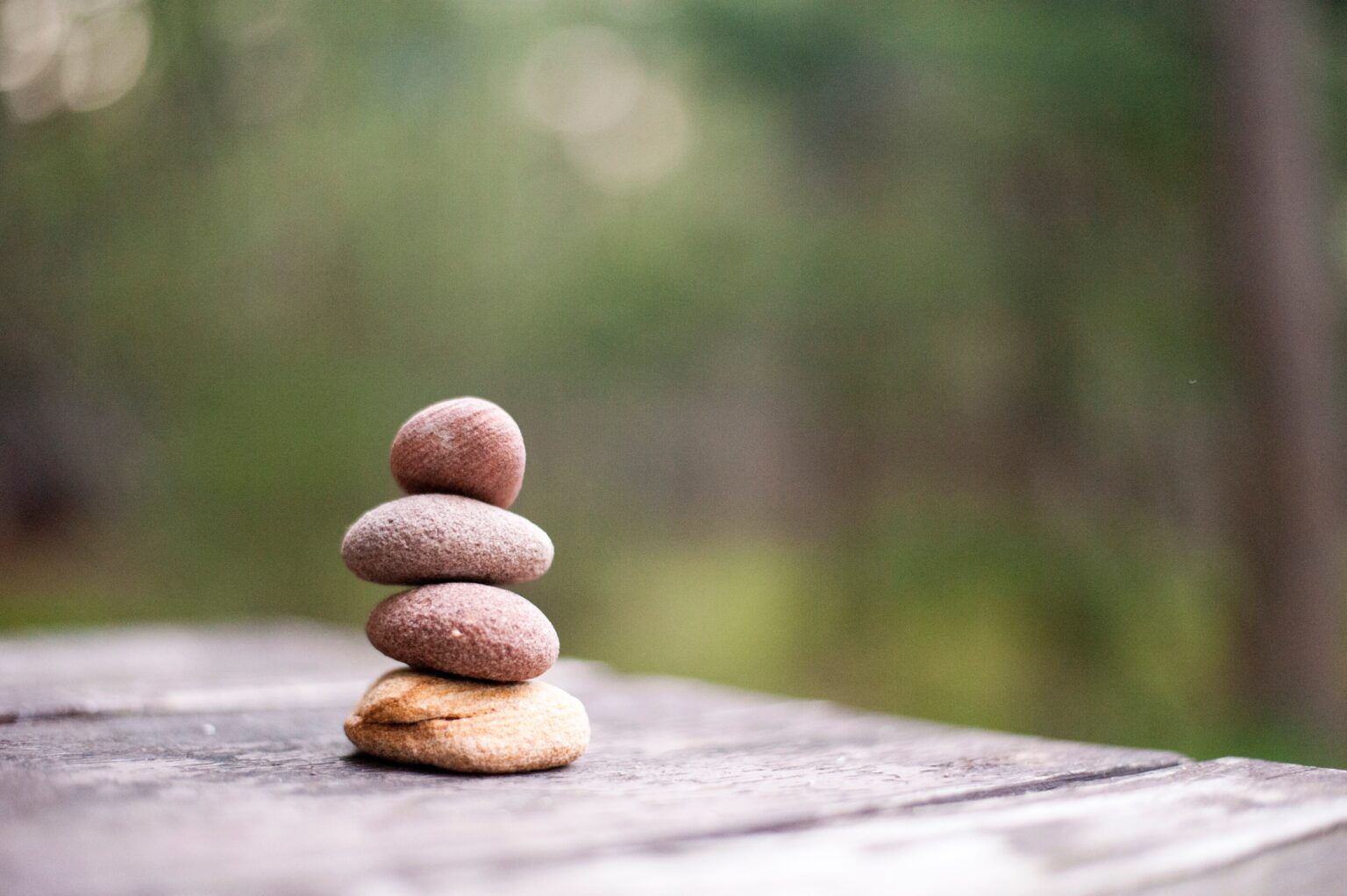

“Wherever you are, there you are.”
One of my teachers would often drop this one-liner in both her asana and meditation classes. It was a call to practice presence. It was a call to practice mindful awareness. It was a call to practice santosha.
Santosha, or contentment, is the second of the five Niyamas (observances) laid out within the Yoga Sutras. The Yoga Sutras of Patanjali – compiled between the 2nd-3rd centuries CE – is a text of 196 thoughts and observed truths woven into a sequence that offers insight into one’s personal practice – a roadmap to the Self. Within the second chapter, Patanjali offers advice on the nature of the mind, the nature and removal of suffering, and how to live a yogic lifestyle. It is here that the eight-fold path is introduced starting with the Yamas and Niyamas – yoga’s ethical precepts.
II,30 ahimsa satya asteya brahmacarya aprigrahah yamah
Self-control consists of five principles: non-violence, truthfulness, freedom from stealing, behavior that respects the Divine as omnipresent, and freedom from greed.
II,32 sauca santosa tapah svadhyaya Isvara-pranidhanani niyamah
The precepts also consist of five principles: purity, contentment, self-discipline and purification, self-study, and devotion to the Lord of Yoga.
–Yoga Sutras of Patanjali
as interpreted by Mukunda Stiles
Together, there are ten Yamas and Niyamas. For me, growing up Catholic, the Yamas and Niyamas were a parallel to the Ten Commandments – but rather than the “don’ts” and the potential shame and guilt that can surround the Commandments, the Yamas and Niyamas invite the seeker to cultivate and grow the positive attributes already within in order touch upon True Self. The Yamas are the self-regulating behaviors that involve the interactions with others and the world at large. The Niyamas are then the internal observances and personal practices that seek to cultivate a steadiness of character – creating a foundation for spiritual practice.
While the thought of mastering all ten Yamas and Niyamas may seem overwhelming, there is a belief that by practicing only one of the ten positive attributes, the remainder will naturally fall into place. When I went through my 200-hour yoga teacher training, there was an invitation to practice one of the ethical precepts both on and off the mat. At the time, the Shakespearean phrase “to thine own self be true” had deeply resonated with me so it was natural to choose and practice satya or truthfulness. Satya invites the yogi to be truthful in thought, word, and deed not only with others but also with themselves. For me, satya asked me to become brutally honest with who I was and to embrace both the light and shadow pieces of myself. Once I started to untangle and reconcile all the stories of my past, I was able to not only experience my inner universe with greater clarity but also able to settle into a place of greater happiness and peace.
“By firmly grasping the flower of a single virtue, a person can lift the entire garland of Yama and Niyama”
– Swami Kripalu
Santosha is to practice contentment within each moment. It is to be calm with both success and failure. It is to be joyful in all that life has to offer. It is to accept any distress that life has to offer. It is a state of mind in which one does not depend on the external world to bring happiness.
“Adopting an inner attitude of compassionate self-observation, attention is focused on clearly seeing one’s virtues and shortcomings. Wholesome traits are nurtured. Faults are simply witnessed and allowed to wither. Swami Kripalu called this process character building and saw it as the essence of yoga’s approach to personal growth.”
–Richard Faulds, Sayings of Swami Kripalu
The Kripalu lineage invites the practitioner to become steady in the space of radical compassion – the ability to meet oneself just as they are without judgement. Out of this place of self-observation with compassion, right action emerges – the capacity to know what direction is needed to stay the course of one’s spiritual journey.
Practicing contentment is to be grateful for all that one has while letting go of any need for anything more. Practicing contentment is to find joy in all the experiences that life has to offer. Even if loss or failure presents themselves, the path of Yoga invites the student to continue to explore and grow in their dharma – one’s call in life. This is the call to do one’s duty while letting go of the fruits of their labor – to practice aparigraha (non-attachment) hand in hand with santosha. There is disciple (tapas) in the practice of purifying the mind of the external stimuli – the ability to let go of craving and desires – so that one may experience each moment clearly without the coloring of past experiences or the need to find satisfaction with any future endeavors. Once the seeker firmly establishes themselves in santosha and offers any work from a place of right action and divine will (Ishvara Pranidhana) all the qualities that accompany desire – fear, doubt, worry, anxiety – can diminish and happiness is able to fill the space. True contentment comes when one opens to the light of awareness – the spark of the Divine – the piece within that is unchanging, infinite, and whole.
The Yamas and Niyamas are attributes to be practiced both on and off the mat. With the practice of santosha, that may mean showing up to an asana practice and taking variations or modifications of postures as the energies of the physical body dictate rather than allowing the ego mind to be in the driver’s seat. If on the meditation cushion, santosha can mean letting go of any judgement of the spinning mind or even the mediation itself but gratitude of setting aside the time to connect to one’s higher Self. Santosha is a 24-7 practice – the ability to become steady even amongst the chaos. For me, the practice of santosha has become a practice of gratitude. Grateful to have a roof over my head. Grateful to have food in my refrigerator. Grateful to have clothes on my back. Grateful that I can lace up my shoes and go for a run or walk with my dogs. Grateful for a community of beings that not only inspire me but also challenge me to become the best version of myself. While these things are external, sometimes it is appreciating the small things in one’s life that can unlock the doorway to inner happiness and wisdom of True Self.
II,42 From contentment comes happiness without equal.
–Pandit Rajmani Tigunait,
The Practice of the Yoga Sutra – Sadhana Pada
2026 Power Life, All Rights Reserved.
Built with 🤍 by Blink
2026 Power Life, All Rights Reserved.
Built with 🤍 by Blink Wellness
"*" indicates required fields
Kirk was working 80-hour weeks and wearing his shoulders as earrings when he found yoga in 2005. Forever the competitive athlete, he loved the physicality of yoga. When the spiritual and philosophical side of yoga were exposed to him, Kirk was hooked. Yoga provided him with what other activities couldn’t -- the ability to foster the benefits of practice both on and off of the mat. Yoga was something that Kirk could bring into all aspects of his life.
Kirk knows that yoga can be intimidating, so he crafts a class that is playful and inviting, while still being challenging and safe. His creatively planned classes build strength and flexibility in your body and mind while establishing clarity, giving you more confidence to overcome obstacles in your life, and keeping you injury-free. His classes are themed with a message that is relatable and will inspire you to take it with you off your mat. Kirk has been teaching yoga since 2008 and lead his first teacher training in 2012. Where Kirk truly shines is in coaching, developing and bringing out the best in others.
Kirk enjoys traveling (40+ countries to date!), snowboarding, and cherishes time with his wife and two daughters.
Christen Bakken’s yoga journey began in 1998 in a Bikram studio that provided a safe and secure place to practice. She saw the yoga mat as a place to remember her purpose and a place to play. As she continued her studies and began her journey to teaching in 2006, Christen infused yoga classes with devotion and the yoga mat became a place of personal transformation and healing. Her classes are filled with laughter, song, sweat, and usually heart openers. In 2013, Christen began training yoga teachers. This is the place where she finds the most joy - in community with folks looking to grow and be of greater service in their homes, on their mats, and in the world. Over the years, she has led trainings in Denver, the Midwest, Florida, and now abroad. She has trained in continuing education modules, 200-hour, 300-hour, and 500-hour programs. Beyond the mat, Christen is a passionate adventure seeker - she loves to bike, snowboard, and spend time with her husband and pups. She sees each day as a blessing and hopes to remind all who interact with her of this truth.